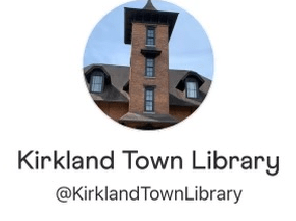What the library is doing
What is “Your Library, Your Voice?”
Under NYS Education Law section 259, association libraries are permitted to present their budget on school district ballots. Many other New York State libraries utilize this law to ensure their sustainability. We first utilized this law in 2019, and our inaugural budget was approved by 80% of voters. The advantage of this method is it allows for more direct input into the support our library receives.
Current Budget
How is the library currently funded?
NYS Education Law section 259 = 70.7%
Fundraising = 15.3%
Gifts and miscellaneous = 8.5%
Oneida County = 3.8%
New York State = 1.7%
(based on 2024 funding)
Do you receive funding from the Town of Kirkland or the Village of Clinton?
We do not receive any funding from the Town or Village. The Village provides trucks during our Annual Book Sale on the Village Green.
Benefits to the Community
What will the library do with the money?
In addition to offsetting minimum wage, utility costs, and inflation, which continue to put pressure on our operating budget, this level of funding will allow us to better address the expressed needs and desires of our community. We would build on our current programming levels and offer even more timely and relevant programs for children, teens, and adults. More materials could be added to the collection to meet the interests and demands of patrons.
What are the community benefits of an approved library budget?
One main benefit is that the library could respond quicker to changing community needs. For example, information and technology continue to transform our world. Approving this budget means we can do more to provide opportunities for members in our community to learn about and use existing technologies. We can better assist our school system with offerings that help every child entering school with the requisite developmental skills that nurture a lifelong enjoyment of reading and that allow our teens to explore diverse interests. Every voter could weigh in on the library budget, and by doing so, demonstrate their support of the library’s goals and initiatives.
Why is the library requesting the proposed amount?
The library board carefully studied the amount of money needed to maintain and improve our collection, staffing, programming and services, and building and grounds. Voters will be asked to approve a budget of $355,066. This level of funding gives us the opportunity to provide a greater range of services to our patrons. Our library collection can be more comprehensive, and the offerings will have a greater breadth and depth, with knowledgeable staff available to serve the needs of our patrons.
Why not other funding alternatives?
Why can’t you just charge a fee?
Under Commissioner’s Regulations 90.3 (a) of New York State Education Law, libraries cannot charge library card fees within their own library system. Our library system includes Oneida, Madison, and Herkimer counties.
How did the library pay for the recent construction projects and the carpet replacement?
75% of the funding for construction projects came from State Construction Grants.
95% of the carpet replacement project was funded by the generous support of donors and the Hamilton College Town-Gown Fund.
Could the library seek additional grants and donations?
Annual gifts to the library help cover current operating costs and leave little to nothing for expansion or improvement. The library has consciously sought, and been fortunate to secure, grants that allow us to stretch our dollars while improving our building and offering unique programming and services for all ages. Since 2012, we have applied for and received almost $16,000 in programming and services grants and over $226,800 for building improvements.
Listing of grants received since 2012:
- New York State Construction Grants
- Hamilton College Town Gown Fund
- Community Foundation of Oneida and Herkimer Counties
- National Grid Small Business Incentive
- American Library Association
- National Endowment for the Humanities (in partnership with Hamilton College)
- New York Council for the Humanities (now Humanities New York)
- CNY Arts
- Gilder Lehrman Institute of American History
- Central New York Library Resources Council
- MidYork Library System Grants
- Stewart’s Holiday Match Grant
Why can’t the library reduce its operational costs?
Our current operating budget is lean without any wiggle room to reduce operating costs. We are fortunate that early in the library’s history, we were able to purchase our historic building, but it still needs to be maintained. As any homeowner knows, putting off repairs ends up costing more in the long run. We want to continue to offer the members of the community accessibility to the library. Plus, the KTL is much more than a place to get a book or attend a program — it acts as a community center, and many visitors come to gather with friends, new and old.
Why can’t the library hold more fundraisers to increase revenue?
Approximately 24% of our annual operating income comes from our annual appeal, the book sale held each year by the Friends Committee and gifts. We could not operate the library without these efforts and our community’s generosity. However, relying on this much of our income from a source that fluctuates is not prudent fiscal management. Community-based funding allows for a stable income stream and allows gifts to be directed toward innovative projects or unique programs not be covered in an operating budget.
Why should I support the library if I don’t use it?
A library is part of the town’s educational system and contributes to our attractive quality of life. We are there for babies acquiring the pre-literacy skills so important to school success and for retirees interested in expanding their comfort with technology. Indeed, we are the only community space that provides services to people of all ages, regardless of economic status. We make our town better. We make this a place people want to call home. You may not use the library, but your neighbors, friends, the youth of our community, and Town of Kirkland business owners do. They come for local organization meetings and educational programs, to use our computers and conduct research, or to borrow books, a telescope or snowshoes. Your support of this initiative means all of the ways the library serves this community will continue uninterrupted.
Effect on Community Members
Will this result in an additional or new charge on my property bill?
The library assessment already shows on your school district bill. As in countless communities across New York, those who vote determine the value of their library, and the vast majority of those votes are successful. Community-based funding will ensure that the library remains viable now and into the future.
Will library funding automatically increase each year?
While the library does not need to put its budget out for a vote every year, the Board of Trustees discusses any budget increases which would then be voted on by community members.
Who decides how the money is used?
The Kirkland Town Library Board of Trustees has the overall fiduciary responsibility for the library. Working closely with the library director, they set the annual budgets. The board also takes into account best practices in library services and collections.
How much will the library budget cost me?
For 2025, the library tax levy in the school vote would add just $.02 per $1,000 of assessed home value.
Voting Details
When and where do I vote?
Voting will take place on Tuesday, May 20, from noon to 8 p.m. in the Clinton Central School Theater Lobby.
What is the ballot language?
RESOLVED, that the Board of Education of the Clinton Central School District is hereby authorized to levy taxes annually in the amount of $355,066 which will be distributed to the Kirkland Town Library to provide public library services to school district residents.
Other
What happens if the vote fails? Would the library still receive funding through NYS Educational Law 259?
Yes. The library would remain at the current funding level approved by voters in 2024.





